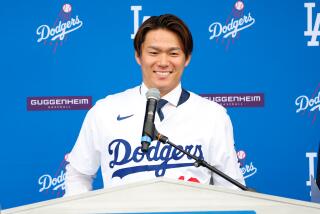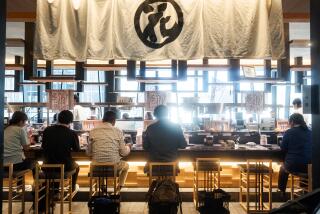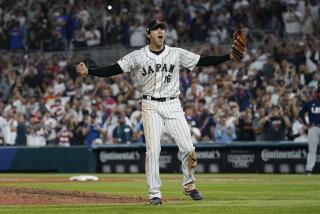Foreign Policy Is Domestic Politics
An unusual thing happened on the world stage a few weeks ago. Tokyo actually took some initiative in world affairs. Its tough new prime minister unexpectedly pressed, however politely, for a quick meeting in America prior to the previously announced Tokyo summit in April. President Clinton, who had unceremoniously canceled last November’s trip to Japan (an oafish mistake that did little for America’s image throughout Asia), this time listened to his Asia experts, who believe Ryutaro Hashimoto may prove to be a man America can deal with, and said yes. The result was Friday’s hour-long meeting in Santa Monica, which looked as good as any 60-minute summit ever does.
The waters of U.S.-Japan relations have been roiling for months now. Last December, Japan’s top representative in Southern California, the ordinarily low-key Seiichiro Noboru, gave an important Cassandra-esque speech to business people here. At stake in Japan-U.S. relations, he suggested, is the entire postwar structure of Asian security.
He’s right. America has no Great Britain-equivalent in Asia to help out, and the United States and Japan are unlikely to achieve such a storied special relationship. But on Friday, the two leaders appeared to be seeking at least a special personal relationship. The real payoff, if any, will come in April when they sit down in Tokyo. But it looks as if these two crafty pols have at least agreed not to let things deteriorate bilaterally. Said one savvy State Department official: “Hashimoto and Clinton are two very good politicians. They need each other to be successful. So they looked each other in the eyes Friday in Santa Monica and said: Let’s figure out how we can help each other.”
Clinton will have to run for reelection on his record of favoring open markets and trade accords like NAFTA. How wildly protectionist would a Buchanan-influenced-if-not-led Republican ticket get? There’s no telling, but it won’t help Clinton’s campaign if the Japanese are violating trade accords and otherwise causing embarrassment. For Hashimoto, who is the fifth Japanese PM since Clinton’s election and who is embroiled in an S&L-type; mess back home, the 10-hour trip from Tokyo to L.A. was more than twice the duration of Clinton’s from Washington. But it was worth the trek. To his own public, the former trade minister now looks rather nattily jet-set, high-level and aggressive. “All foreign policy is domestic politics,” quipped a State Department source.
That’s sure true of our own maximum leader, isn’t it? Clinton rarely gets much involved in a foreign policy question unless domestic pressures all but compel it. Less than two weeks after the White House canceled the president’s trip to Osaka for the November Asian economic summit, saying he was simply too bogged down in the Capitol Hill budget crisis to travel, Clinton went to Ireland on a peacekeeping mission. Asians all over the Pacific Rim must have concluded that America thinks Europe counts for more than Asia.
Consul General Noboru, head of Japan’s well-regarded diplomatic mission in L.A., encapsulated that resentment in his December speech charging that America and its media were shortchanging Asia. “The tremendous [U.S.] media attention focused on [Clinton’s] trip to Ireland would almost make one think he was driving out the snakes,” he commented, adding that, by contrast: “The media in the U.S. scarcely murmured a word of criticism [of the President] for failing to keep a date with the leaders of perhaps the most important economic region in the world.”
He’s right, too, about the economics. In 1994, U.S. trade with the Pacific Rim (including all-important Mexico and Canada) exceeded trade with Europe. In 1995, California’s exports increased by 17%; half of that was gobbled up by the top 10 Asian markets. But mere moolah isn’t the whole story. As Princeton’s Kent E. Calder, director of the Woodrow Wilson School’s program on U.S.-Japan relations, says in his incisive new book “Pacific Defense”: “Far more Americans have died in Asian battle over the past half century--from Saipan and Okinawa to Pork Chop Hill and Khe Sanh--than in any part of the world. Yet we persist in our view of Asia as a prosperous, placid region. Quietly, however, a new danger zone has been rising, with global implications.”
If armed conflict does ignite between Beijing and Taipei in the Taiwan Strait, or if starving, struggling and paranoid North Korea were to lunge irrationally across the 38th Parallel, there would be hell to pay. And we (and the Japanese, as they very well know) would wind up paying for most of it.
Cunning politicians can sometimes reach beneficial understandings based on their mutual survival needs. Are Clinton and Hashimoto two of that kind? Could be. At the end of the 60-minute Santa Monica summit, Hashimoto, an amateur shutterbug, gave Clinton a gift--a cleverly filtered portrait of the sun setting on the Pacific. Clinton responded with a White House photo of a Southwest American scene. They even tried to call each other by their first names. This was a whole lot better than if they had started calling each other other kinds of names.
More to Read
Get the L.A. Times Politics newsletter
Deeply reported insights into legislation, politics and policy from Sacramento, Washington and beyond. In your inbox three times per week.
You may occasionally receive promotional content from the Los Angeles Times.










